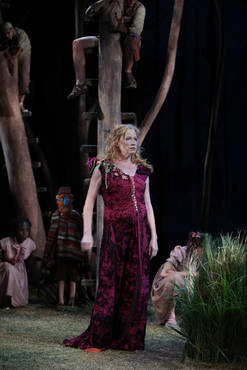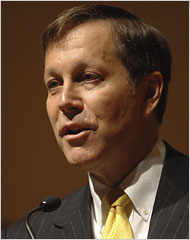I review two shows in this week’s Wall Street Journal drama column, one in Connecticut and one in New York: Hartford Stage’s A Midsummer Night’s Dream and the York Theatre Company’s off-Broadway revival of Enter Laughing: The Musical. Both are excellent. Here’s an excerpt.
* * *
 If it’s summer, somebody’s doing “A Midsummer Night’s Dream.” I’ve seen two very different productions in the past two weeks, and I’d hate to have to choose between them. Fortunately, art isn’t sports, so I’m not required to pick a winner. Suffice it to say that Connecticut’s Hartford Stage, like Wisconsin’s American Players Theatre before it, has done exceptionally well by Shakespeare’s best-loved comedy.
If it’s summer, somebody’s doing “A Midsummer Night’s Dream.” I’ve seen two very different productions in the past two weeks, and I’d hate to have to choose between them. Fortunately, art isn’t sports, so I’m not required to pick a winner. Suffice it to say that Connecticut’s Hartford Stage, like Wisconsin’s American Players Theatre before it, has done exceptionally well by Shakespeare’s best-loved comedy.
Lisa Peterson, a well-established director whose work is new to me, has put a winningly new spin on the timeless tale of two troubled young couples who wander into an enchanted wood, run into a gaggle of mischief-making fairies and emerge unscathed and happy. In Ms. Peterson’s modern-dress version, the mere mortals reside in the never-never land of ’50s family sitcoms, while Fairyland is a cross between “Peter Pan” and “Lord of the Flies,” a land of raucous, grubby-faced children who speak and sing in unison and tumble about the stage with unholy glee.
Sometimes a set makes a show, and Rachel Hauck, who designed the Pissarro-influenced production of “The Winter’s Tale” that I saw and loved at the Oregon Shakespeare Festival two seasons ago, has outdone herself this time around. Her décor is simple–a forest, a small platform, a window that seems to float in mid-air and a trapdoor that is put to ingenious use–but magical….
Remember Carl Reiner? You do if you owned a TV back in the days when he was a regular and welcome presence on “Your Show of Shows” and “The Dick Van Dyke Show.” Now Mr. Reiner is an elder statesman of comedy, and the York Theatre Company, which usually specializes in small-scale Off-Broadway mountings of new musicals, has revived “Enter Laughing,” the 1976 musical version of his semi-autobiographical 1958 novel about David Kolowitz (Josh Grisetti), a geeky, star-struck kid from the Bronx who longs to become an actor. It’s a charmer, cleverly staged and choreographed by Stuart Ross (“Forever Plaid”) and acted by the best cast in town….
Mr. Ross’ cast includes such familiar faces as Jill Eikenberry and Michael Tucker, formerly of “L.A. Law,” and George S. Irving, the oldest of old pros, who made his Broadway debut in the original cast of “Oklahoma!” and appeared 33 years later in the original cast of “So Long, 174th Street,” as “Enter Laughing: The Musical” was originally known. Then as now, Mr. Irving plays Harrison Marlowe, a plummy-voiced, deeply fraudulent director who casts David in his new show, and every word that comes out of his mouth is a joy to hear.
* * *
Read the whole thing here.
Archives for September 12, 2008
TT: Make room for surprise
 The most important American art exhibition of the 2008-09 season, Richard Diebenkorn: The Ocean Park Series, 1967 to 1985, goes up on October 11 at the Orange County Museum of Art in Newport Beach, California. Not New York, not Philadelphia, not Chicago, not even San Francisco. What gives here? The answer, as those who esteem Diebenkorn know all too well, is that his greatness has yet to be fully acknowledged by large tracts of the American art establishment. Why? Because he doesn’t fit into the Cézanne-Picasso-Pollock narrative that many critics and curators use to “explain” the history of twentieth-century art. He switched from abstraction to figurative painting when the New York School was at the peak of its popularity, then switched back just as abstract expressionism was giving way to Pop Art. As if all that weren’t bad enough, he had the poor taste to live in…California. How déclassé is that?
The most important American art exhibition of the 2008-09 season, Richard Diebenkorn: The Ocean Park Series, 1967 to 1985, goes up on October 11 at the Orange County Museum of Art in Newport Beach, California. Not New York, not Philadelphia, not Chicago, not even San Francisco. What gives here? The answer, as those who esteem Diebenkorn know all too well, is that his greatness has yet to be fully acknowledged by large tracts of the American art establishment. Why? Because he doesn’t fit into the Cézanne-Picasso-Pollock narrative that many critics and curators use to “explain” the history of twentieth-century art. He switched from abstraction to figurative painting when the New York School was at the peak of its popularity, then switched back just as abstract expressionism was giving way to Pop Art. As if all that weren’t bad enough, he had the poor taste to live in…California. How déclassé is that?
In this week’s “Sightings” column, which appears in tomorrow’s Wall Street Journal, I use the Orange County retrospective as an occasion to discuss the insidious effect of historical narratives on the immediate experience of art. Too many people believe what they read instead of seeing what they see, and Diebenkorn is one of many artists whose reputation has suffered as a result. If you want to know why that happens, pick up a copy of Saturday’s Journal and read what I have to say.
UPDATE: Read the whole thing here.
Alas, I made a not-so-little mistake in this week’s column: Orange County’s Diebenkorn show goes up next October 11, not this October 11. Sorry about that. Plan ahead!
TT: Moving on
 Dana Gioia is announcing today that in January he will be leaving the National Endowment for the Arts, which he has chaired for the past six years. “Six years is a long time in a job,” he told the Washington Post. “I have done most of the things I set out to do. I really want to go back to writing. I haven’t had time for my own writing. I write all the time for the NEA, official writing. Since I have become chairman, I have not published a poem.”
Dana Gioia is announcing today that in January he will be leaving the National Endowment for the Arts, which he has chaired for the past six years. “Six years is a long time in a job,” he told the Washington Post. “I have done most of the things I set out to do. I really want to go back to writing. I haven’t had time for my own writing. I write all the time for the NEA, official writing. Since I have become chairman, I have not published a poem.”
As readers of this blog know, President Bush nominated me to sit on the National Council on the Arts, and the Senate confirmed me unanimously to a six-year term in 2004. It was, of course, Dana’s idea that I should serve on the NCA–we are old friends–and I accepted unhesitatingly, albeit a little nervously. Since then, though, I’ve seen from the inside how the NEA operates, and I’ve been very impressed. As for Dana, I recently told a colleague of mine that I thought he might well be remembered as the Bush administration’s single most effective appointee. The Post says that he is “credited with helping revitalize” the NEA. That’s putting it mildly.
Be that as it may, it also happens that Dana is a marvelous poet, and it strikes me that the world is more in need of poets than administrators. To be sure, one of his most beautiful poems, “Words,” questions the importance of poetry itself:
The world does not need words. It articulates itself
in sunlight, leaves, and shadows. The stones on the path
are no less real for lying uncatalogued and uncounted.
The fluent leaves speak only the dialect of pure being.
The kiss is still fully itself though no words were spoken.
True enough–but a man who can write like that ought not to spend too long in the stony wilderness of bureaucratic endeavor, no matter how worthy the cause may be. So hit the road, Dana, and don’t forget to bring your pad and pencil! You have work to do.
* * *
The Post story announcing Dana’s departure is here.
TT: Almanac
“Comedy is tragedy that happens to other people.”
Angela Carter, Wise Children
